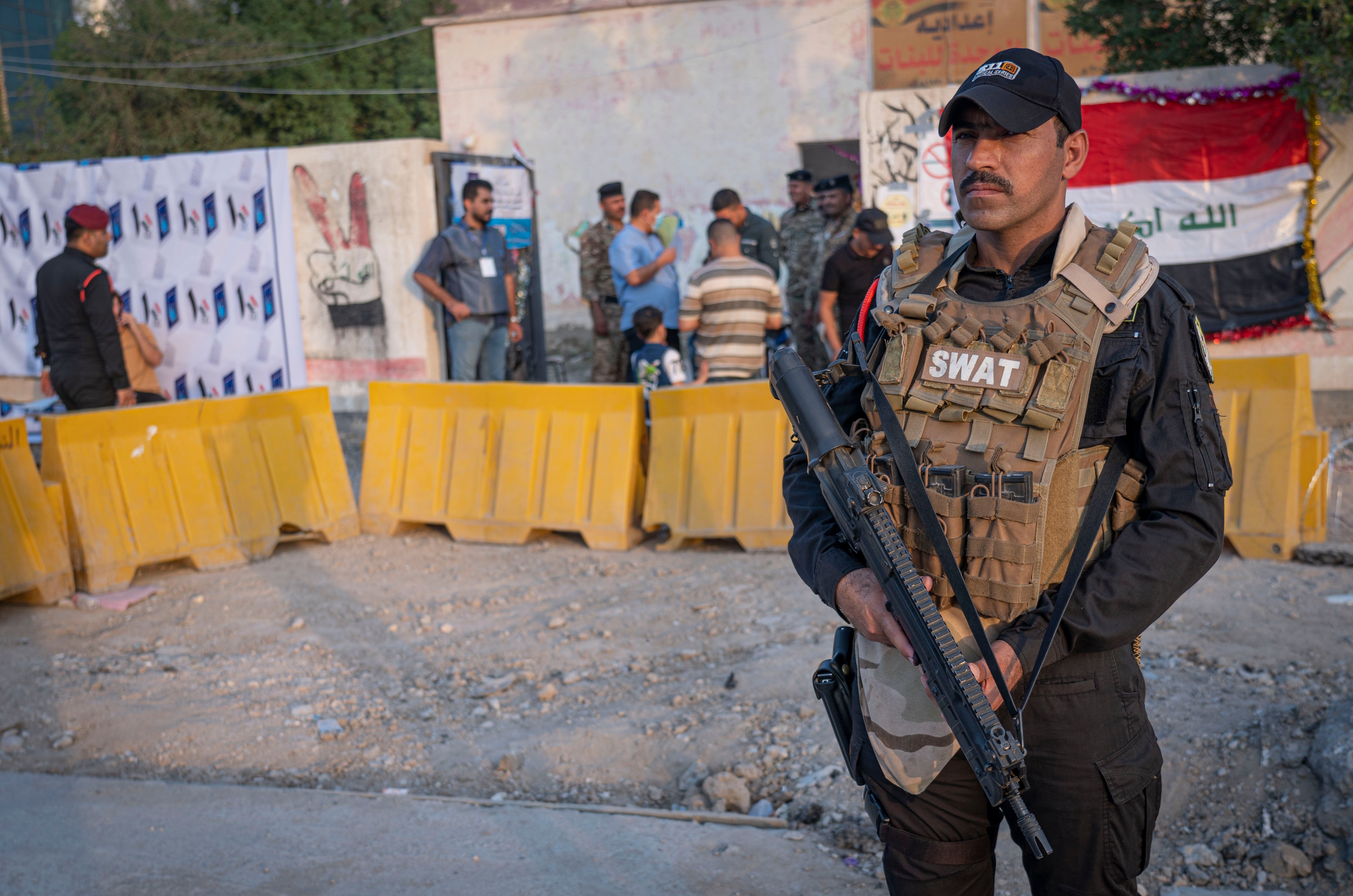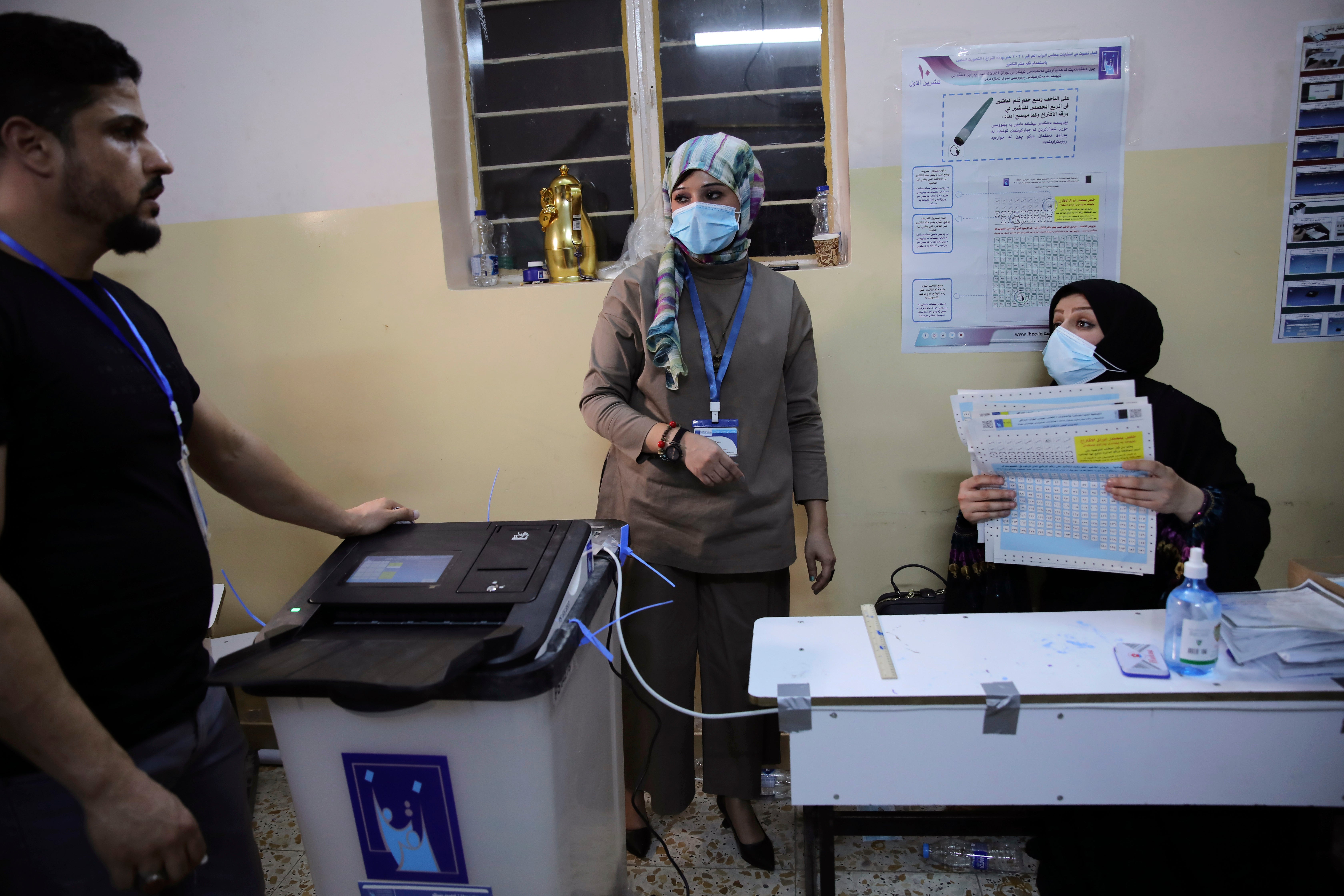‘We want real change’: Iraqis vote in early election seen as test of democracy
Over 250,000 security personnel have been deployed to secure the vote amid concerns it will not deliver promises of reform

Your support helps us to tell the story
From reproductive rights to climate change to Big Tech, The Independent is on the ground when the story is developing. Whether it's investigating the financials of Elon Musk's pro-Trump PAC or producing our latest documentary, 'The A Word', which shines a light on the American women fighting for reproductive rights, we know how important it is to parse out the facts from the messaging.
At such a critical moment in US history, we need reporters on the ground. Your donation allows us to keep sending journalists to speak to both sides of the story.
The Independent is trusted by Americans across the entire political spectrum. And unlike many other quality news outlets, we choose not to lock Americans out of our reporting and analysis with paywalls. We believe quality journalism should be available to everyone, paid for by those who can afford it.
Your support makes all the difference.Polling stations opened across Iraq on Sunday morning for early elections that many hope will deliver much-needed reforms.
Security was heightened for the occasion as more than 250,000 personnel were deployed throughout the country that has also closed its airspace, land borders and internal roads.
Fighter jets screamed across the skies of Baghdad as voters could choose from 3,449 candidates vying for 329 seats in the parliament.
It is the fifth national vote held since Saddam Hussein was toppled in the US-led invasion of Iraq in 2003. It is also seven months early: a key demand of a popular uprising that erupted in 2019.
The Tishreen movement has seen tens of thousands of people take to the streets protesting endemic corruption, crumbling infrastructure, soaring unemployment and the proliferation of armed groups. But the rallies were met with deadly strength by security forces; more than 600 people were killed and thousands injured within just a few months.
The country’s new prime minister Mustafa al-Kadhimi eventually bowed to the uprising demands for an early vote and new elections law but despite this, young activists have called for a boycott of the polls that they believe will be dominated by the political old guard.
A string of forced disappearances and targeted assassinations that have killed more than 30 people has further discouraged voters from taking part.
At one polling station in a mixed neighbourhood of Baghdad, voters told The Independent they feared the elections would bring no change.
“I am voting for ‘Imtidad’ and I hope this time my vote will not let me down, but I am pessimistic,” said Arshad Yasir, 40, referring to a new political party comprised of activists who are participating in the ongoing protests.
“People have not learned the lesson over the last 18 years that all politicians after 2003 are bad and corrupt,” he added
“I want to see real change. I want to see Iraq emptied of weapons, and its children put to work building and developing infrastructure, industry, agriculture instead.”
There are concerns that turnout might be even lower than the 2018 elections, with just 44 per cent of Iraq’s 24 million eligible voters casting their ballots.
Iraq’s key leaders and religious figures have tried to rally support for the elections. Iraq’s top Shiite cleric Grand Ayatollah Ali al-Sistani, a widely respected authority, called for a large turnout, saying that voting remains the best way for Iraqis to take part in shaping their country’s future.
The country’s prime minister repeated the message as he cast his ballot at a school in Baghdad’s heavily fortified Green Zone, on Sunday.
“Get out and vote, and change your reality for the sake of Iraq and your future,” Mr Kadhimi said repeatedly.
“To those who hesitate, put your trust in God and go and choose those you deem appropriate," he added. “This is our opportunity for reform.”
I want to see real change, Iraq emptied of weapons, and its children put to work building and developing infrastructure, industry, agriculture instead
Many predict a tight race between the Sadrist Movement, founded by Iraq’s influential Shia cleric Moqtada al-Sadr, that won the 2018 race and the Fatah Alliance, led by paramilitary leader Hadi al-Amiri, which came in second place in the last election.
The Sadrist Movement, which has an armed wing called Saraya al-Salam, initially planned to boycott the election but returned with full force fielding 95 candidates.
Marwa Raheem Atya, a female Sadrist candidate in the southern city of Nassiriya told The Independent they hope to nearly double the number of seats they secured in 2018.
“I have full confidence in our leader making change in Iraq; we have a smart and strong captain of the ship in him,” she said.
“We promise to make Iraq a country for Iraqis, and to tighten uncontrolled access to weapons,” she added.
It is the first time a vote has taken place under the country’s new election law which divides Iraq into 83 smaller constituencies – another demand of the protesters, and a move experts say will help allow independents to run and win seats in the parliament.
Among those new parties, however, are those with alleged links to Iraq’s powerful armed factions, ratcheting up concerns.
Hussein Muanis, once the chief of security for Kataib Hezbollah (KH), the country’s most hardline Shia parliamentary militia, founded Harakat Huqooq (or “Rights Movement”) which is fielding 32 candidates and pushing an electoral program focused on the departure of US troops from Iraq.
Experts say because of Mr Muanis’s KH affiliations, this signals the militant group’s formal entry into politics.
KH has vehemently denied this.

Muthana Fayhan, a Harakat Huqooq candidate for Baghdad told The Independent they have nothing to do with the armed group.
It is also the first time European Union observers will be monitoring the vote, with up to 600 international observers, including 150 from the United Nations.
And in another first, the country has introduced biometric cards for voters aimed at preventing abuse of electronic voter cards; they will be disabled for 72 hours after each person votes, to avoid double voting.
But despite these measures, claims of vote-buying, intimidation and manipulation have persisted.
Some reported that the new electronic system was not working.
The head of Iraq’s electoral commission has said that initial election results will be announced within 24 hours.

Join our commenting forum
Join thought-provoking conversations, follow other Independent readers and see their replies
Comments